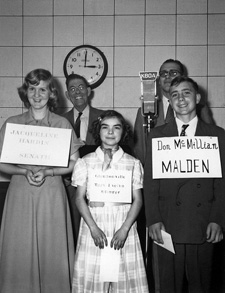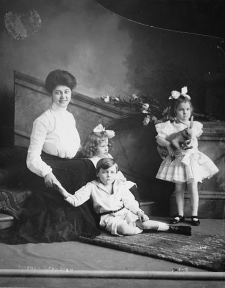TW Column by Emily Toth
When the rage for memoirs hit a few years ago, I was seized with a wild ambition. I was an underappreciated genius with a strong ego. I’d seen a celebrity or two. I had thoughts. I yearned to expose myself in print.
 But when I sat down to write, I had trouble summoning up a shocker, a lurid misdeed that might make me forever notorious.
But when I sat down to write, I had trouble summoning up a shocker, a lurid misdeed that might make me forever notorious.
Here’s the sad truth. While my high school classmates were kicking up their heels with sex, drugs, and rock ‘n’ roll, I was a Cleveland Press spelling champion. I even won a trip to Michigan because I’d mastered erysipelas and catarrh. I was a star of an uncommon sort—and now, for the first time ever, I’m reaching into my heart and confessing that I’m a phenomenal speller.
How nerdy can you be?
I’m also handicapped as a writer because I had a happy childhood. I don’t have material for an exposé or revenge book like Mommie Dearest. My Jewish mother was a great wit, a yenta who taught me to love gossip. She also made great chopped liver.
I didn’t survive homelessness, nuttiness, or brutality and make great art out of them, as did Dorothy Allison, Maya Angelou, and Jeannette Walls. Their books are especially riveting because I never knew their kind of world.
What I have, instead, is an endless curiosity. I’m kind of a voyeur, as Jonathan Yardley suggested in his review of my first Kate Chopin biography. Emily Toth, he wrote, is “an academic mole gnawing on the corpus of Kate Chopin.”
If I hadn’t grown up loved and secure, that might’ve wiped me out. Instead, it spurred me to further gathering of other people’s secrets.
I’d already done a biography of Grace Metalious, author of Peyton Place. Metalious’s descendants were candid and generous to me when they talked about her obsessive drive to write—which included locking her children out in the snow while she pounded away at her typewriter. She hated the rich and powerful, and she wanted to expose them.
Metalious was 32 when she published Peyton Place, an instant bestseller. She couldn’t cope with the fame and harassment, and drank herself to death before she was 40. I last interviewed her daughter Marsha not long before Marsha’s own fortieth birthday. She was thinking poignantly about what it would mean to outlive her mother.
Virginia Woolf says that we think back through our mothers. I wish that Kate Chopin’s daughter, who published six books about card games, had also put out a memoir about her mom. Lelia Chopin Hattersley, who died in 1962, outlived her mother by more than half a century. She might have told us whether they had a back-and-forth, sometimes sulky, relationship, as suggested in the few hints that survive.
 I also wonder if Lelia knew the secrets that I know. Kate Chopin had been called a devoted wife and widow—but when she wrote about wives with roving eyes, she wasn’t just theorizing. In her thirties, Chopin had seriously glommed onto another woman’s husband—a charming, violent man who gave her bittersweet pleasure and a lifetime of material. His name was Albert, and all her tempestuous male characters are like him. Their names even begin with A.
I also wonder if Lelia knew the secrets that I know. Kate Chopin had been called a devoted wife and widow—but when she wrote about wives with roving eyes, she wasn’t just theorizing. In her thirties, Chopin had seriously glommed onto another woman’s husband—a charming, violent man who gave her bittersweet pleasure and a lifetime of material. His name was Albert, and all her tempestuous male characters are like him. Their names even begin with A.
Chopin’s more recent descendants have cheered and abetted my burrowing into her life—and so have Albert’s. They share pictures and family stories, and we’ve even come up with a rough-and-ready diagnosis for Albert. He was a wealthy Louisiana plantation owner who could be romantic and gallant—until alcohol brought out the beast in him. We would now call him bipolar, a self-medicator who relied on brandy in the days before manic depression had any other treatment.
Bipolar behavior also seems to weave through the lives of Albert’s descendants. His son, similarly charming and violent, fathered a dozen children. Some of them had very troubled lives, and so did some of their offspring. Some of Albert’s great-great-great-grandchildren now live in Louisiana—and even look like him.
If I were a genealogist or a geneticist, my research would be never ending. Some of it might also be unprintable, an invasion of privacy. But I’m proud to be introduced as the family biographer—a unique and rather noble calling.
Meanwhile, it’s unlikely that I’ll ever be gossip worthy, and so far I’ve confined myself to the secrets of the dead.
I once wanted to write about Lillian Hellman, who was cantankerous and lawsuit-happy in her last days. My agent pleaded with me not to research Hellman (“You’ll put me in the hospital!”), and I desisted. But once Hellman died, half a dozen biographies came out immediately. I know how to spell vulture.
A few weeks ago, I read Henry Alford’s characterization of Aretha Franklin as a “noted speller,” and I wondered respectfully: Wouldn’t it be nice to have a support group for those in the spelling biz?
Maybe Aretha Franklin will join one with me. Maybe I can tell her story to the world. She’s just broken off an engagement—and as a lifelong smoker, she may even know about erysipelas and catarrh. Surely she has secrets.
I wonder if she could use a good biographer?
Publishing Information
- Henry Alford, Would It Kill You to Stop Doing That? A Modern Guide to Manners (Twelve, 2012).
- Dorothy Allison, Two or Three Things I Know for Sure (Dutton, 1995).
- Maya Angelou, I Know Why the Caged Bird Sings (Random House, 1969).
- Kate Chopin, The Awakening (H Stone, 1899) and short stories with “A” characters: “At the ‘Cadian Ball,” “Desiree’s Baby,” “In Sabine,” “The Storm.”
- Christina Crawford, Mommie Dearest (William Morrow, 1978).
- Grace Metalious, Peyton Place (Julian Messner, 1956).
- Emily Toth, Inside Peyton Place: the Life of Grace Metalious (Doubleday, 1981).
- Emily Toth, Kate Chopin: A Life of the Author of “The Awakening” (William Morrow, 1990).
- Emily Toth, Unveiling Kate Chopin (University Press of Mississippi, 1999).
- Jeannette Walls, The Glass Castle (Scribner, 2005).
Art Information
- “Dunklin County Spelling Bee” by Steve Mays; Creative Commons license
- “Mother & Children”; George Grantham Bain Collection, Library of Congress Prints and Photographs Division; public domain
 Emily Toth is a contributing writer at Talking Writing, where her column “Nothing but the Toth” appears regularly.
Emily Toth is a contributing writer at Talking Writing, where her column “Nothing but the Toth” appears regularly.
“I did figure out that celebrity women’s life stories usually involve abuse ("Underneath the glittering facade was a scared little girl..."). Celebrity men’s stories usually depict their subjects as ordinary guys—like you and me but with penises.” —Secretly Reading Trashy Books By Men
